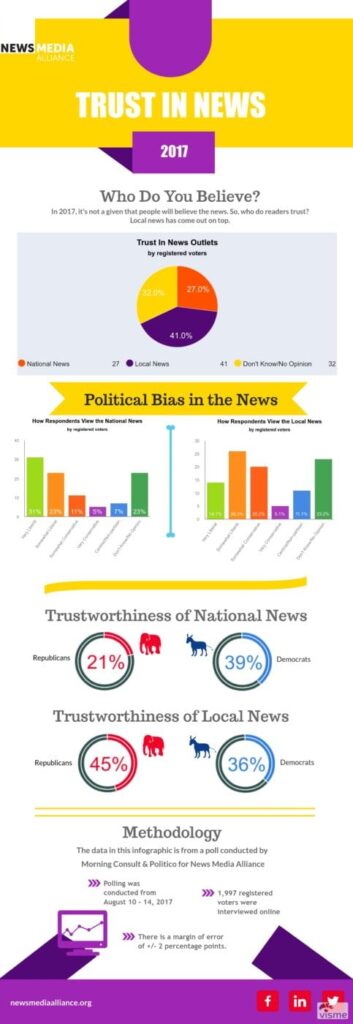
Some good news for newspapers: People still trust their local news outlets. At a time when trust in the news media has been waning and people regularly decry any story as “fake news” that doesn’t reflect their personal viewpoint, 41 percent of registered voters believe their local news can be trusted more than the national news.
That figure comes from an August study by Morning Consult/Politico, conducted for the News Media Alliance, which polled a national sample of 1,997 registered voters. Of those voters, 68 percent said they trust the news, with 41 percent finding the local news most trustworthy and 27 percent saying they trust the national news more. The remaining 32 percent were unsure or didn’t have a preference.
Conservative voters were particularly trusting of local sources, with 48 percent of Republican men and 42 percent of Republican women trusting local news, and 45 percent of all Republican voters saying they find their local news outlets more trustworthy than national news.
Part of that skew is likely because more than half of news consumers seem to perceive national news as having a liberal bias, with 54 percent of all respondents saying they think national news is either somewhat or very liberal. Only 16 percent viewed the national news as somewhat or very conservative. When it comes to local news, however, there’s a much more even split, with 40 percent viewing their local news as somewhat or very liberal and 25 percent viewing it as somewhat or very conservative. The remaining voters believed that the news either had a centrist/non-partisan lean, or were unsure of any skew.
This might be most noticeable in how those who voted for President Donald Trump in 2016 view the media. While only 20 percent of Trump voters find the national news trustworthy, 45 percent believe their local news can be trusted. For Hillary Clinton voters, the numbers are much closer, with 41 percent trusting national news and 36 percent believing local news is more trustworthy. That difference of opinion is understandable, though, given how Trump supporters view the national news. A whopping 70 percent of Trump voters polled view national news as being somewhat or very liberal, while 49 percent view local news as somewhat or very liberal. For Clinton voters, again, the numbers are less stark, with 33 percent viewing local news as somewhat or very liberal and 44 percent viewing national news as having a liberal bent.
Story continues below image.
“In general, people favor local things over national things and say they trust them more. [For example,] people say they dislike Congress, they distrust Congress, they say Congress is a mess. Nonetheless, they overwhelmingly approve of their local member of Congress at a higher level than they approve of Congress,” says Kathleen Hall Jamieson, director of the Annenberg Public Policy Center at the University of Pennsylvania and a Joan Shorenstein Fellow at Harvard’s Shorenstein Center. “So even when they don’t like their local member of Congress, they will tell you that they think more highly of that person than they think of Congress as an institution. And that’s because you have more local experience with the individual. So it’s not surprising that there’s more confidence in local news than in national news. There are two different phenomena operating: 1) There’s very little political content, so it’s just not controversial, but 2) In general, things that we know more about, that we have more familiarity with and are more tied to our local community, we’re more likely to trust.”
There’s more to the trustworthiness of local news than merely their lack of distinct political bias and news consumers’ familiarity with their local outlets. For most people, the local news source is the only one telling them about where they live and focusing on the issues that matter most to their everyday lives. As we saw with Hurricane Harvey and Hurricane Irma, local journalists were the ones working throughout the storms, and local news outlets were the ones keeping residents abreast of the growing dangers in their areas as the storms tore through Texas and Florida, respectively.
“Local news, good or bad, tells people that their place matters. When done well, it covers and holds accountable government officials, recognizes problems affecting people and takes note of small victories,” says David Beard, a research fellow at Harvard’s Shorenstein Center. “As local papers shrink, the local news comes not just from the local newspaper but from start-up digital sites or NPR affiliates or web versions of other broadcast outlets. Local news often gives local readers/viewers/listeners a voice as well.
“A reader/viewer/listener might have a better chance of meeting or ‘knowing’ a local journalist, or having a friend who does,” adds Beard, who is working with the Knight Foundation on Facebook’s local news project. “A local journalist may like the same sports team or have to shovel snow in winter or rake leaves in fall just like they do. They lose power in big storms, too. They enjoy the local parks, too. That shared circumstance may insulate local news sources from the increasing sense of partisanship of national news sites.”
There are some groups of people, though, who still prefer national news: Democrats, especially men who identify as Democrats; ideological liberals; Hispanics and those who voted for former President Barack Obama in 2012. Considering these groups are mostly left-leaning segments of the population, it’s not surprising that they found the national news more trustworthy by margins of between 2 and 8 percent, as they also viewed national news as having a liberal bent.
As we move forward, we’re likely to see readers and viewers continue to mistrust the national news, especially during times of political debate. However, the study shows promise for the local news media. With more people viewing the local news as trustworthy, and lacking a major political bias, we hope to see an increase in readership of local newspapers, and an increase in subscription and ad revenue directed to these outlets. We’ll be following the issue of trust in news closely, and the impact this changing perception has on the business of news.

Jennifer Peters is former content manager of the News Media Alliance.


